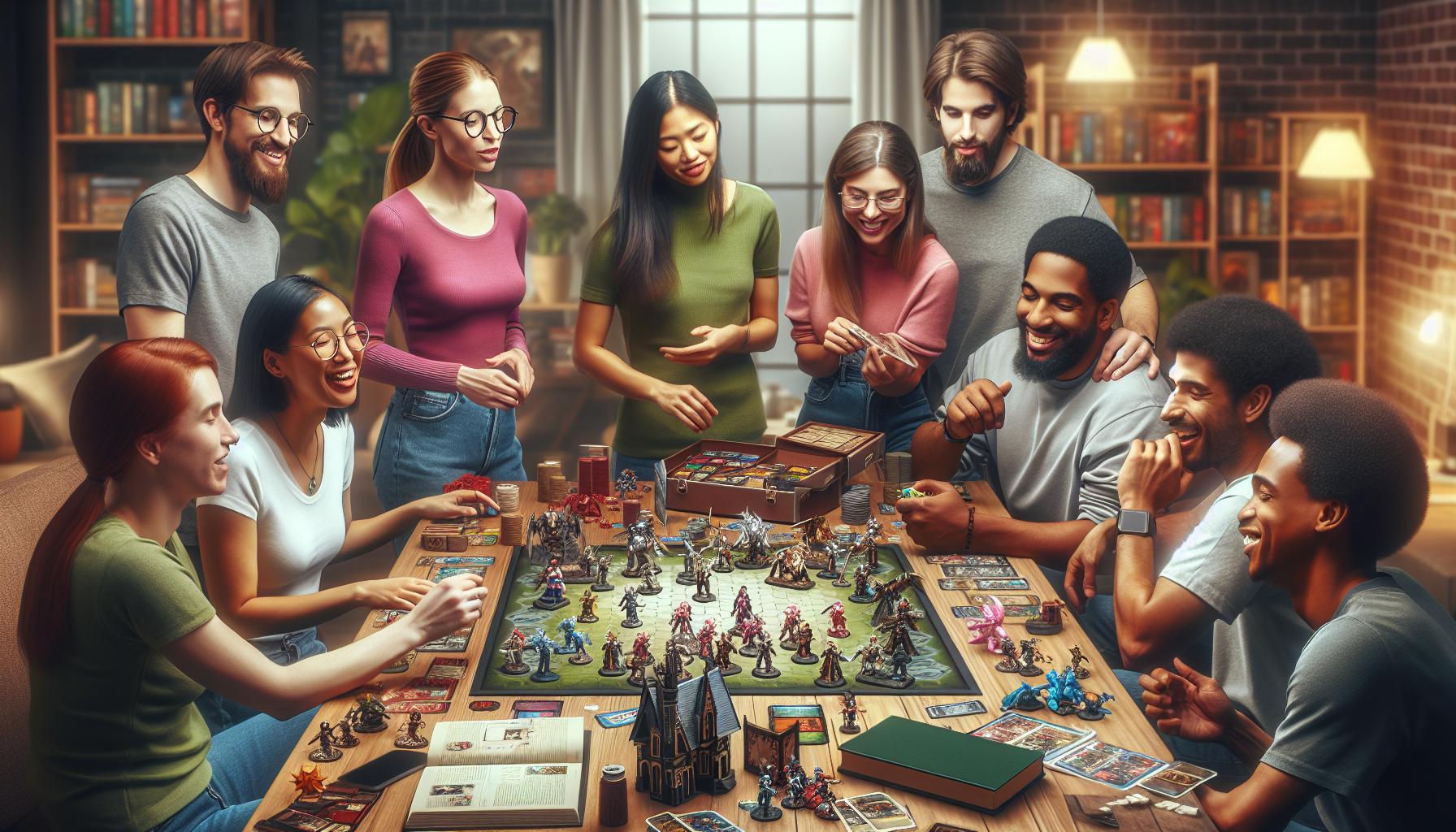Guild gaming has transformed the way we connect and compete in the digital world. It’s more than just a group of players; it’s a community built on shared goals, mutual support, and a love for gaming. I’ve experienced firsthand how being part of a guild can enhance not only gameplay but also friendships that extend beyond the screen. As online games grow in complexity and scale, the importance of guilds becomes even more pronounced. They offer a sense of belonging and a structured environment where players can collaborate, strategize, and achieve collective success. In this article, I’ll dive into the world of guild gaming, exploring its benefits, dynamics, and how it shapes the gaming landscape today. Whether you’re a seasoned player or just starting out, understanding guilds can elevate your gaming experience to new heights.
- Guild Gaming Fosters Community: Joining a guild enhances social interaction and builds strong friendships, creating a supportive environment for players.
- Collaborative Gameplay: Guilds allow members to strategize, share resources, and tackle challenges together, resulting in a more enriched gaming experience.
- Diverse Guild Types: Players can choose from casual or competitive guilds, RPG guilds, and online multiplayer guilds, catering to different gaming styles and preferences.
- Skill Enhancement: Guild membership encourages skill development through teamwork and shared knowledge, helping players improve their gameplay effectively.
- Challenges in Management: Effective leadership and conflict resolution are crucial for guild stability, requiring clear communication and structured approaches to maintain harmony.
- Historical Context: Guilds have evolved from early MMORPGs, adapting to technological advancements and the changing landscape of online gaming communities.
Guild Gaming
Guild gaming facilitates a unique environment where players unite to achieve common objectives. Each guild typically comprises members who share interests in specific games or genres. These communities go beyond mere participation; they enhance social interaction through teamwork and communication.
Guilds offer numerous benefits, including organized events, resource sharing, and strategy development. Members often participate in raids, tournaments, and quests, tackling challenges collectively. This cooperation fosters camaraderie and strengthens friendships within the group.
Diversity defines guild gaming, with each guild possessing a distinct culture and set of rules. Some focus on competitive play, while others prioritize casual gaming or social interactions. This variety allows players to find a guild that aligns with their gaming style and expectations.
Additionally, guild membership provides access to resources and knowledge not typically found in solo play. Players can share tips, tricks, and experiences, leading to improved gameplay and deeper insight into game mechanics. Networking within a guild also opens opportunities for collaboration in achieving higher-level goals.
History of Guild Gaming

Guild gaming has deep roots, originating from early online multiplayer experiences where player collaboration began shaping the gaming landscape. Over time, guilds evolved into complex social structures that enriched both gameplay and community interactions.
Origins of Guilds
Guilds first emerged in the late 1990s with the rise of MMORPGs like “Ultima Online” and “EverQuest.” These early games required teamwork for questing and crafting, prompting players to form guilds to coordinate efforts. These associations allowed players not only to share resources but also to create a sense of identity within the game world. As online gaming technology advanced, so did the complexity and functionality of guilds, laying the groundwork for their integration into modern gaming.
Evolution Through Gaming Generations
Guild gaming experienced significant evolution alongside advancements in technology and gaming culture. In the 2000s, games such as “World of Warcraft” expanded guild features, incorporating guild ranks, rewards, and specific events. The introduction of voice chat and forums further enhanced communication, enabling more strategic collaborations. By the 2010s, with the emergence of MOBA and battle royale games, guilds adapted to shorter, more strategic play sessions while retaining their social dynamics. Today, many games offer integrated guild systems, fostering community engagement across diverse gaming styles. This evolution reflects the enduring significance of guilds in enhancing the gaming experience.
Types of Guilds

Guilds come in various forms, each serving different purposes and player interests. Understanding these types enhances the gaming experience.
Casual vs. Competitive Guilds
Casual guilds prioritize fun and social interactions over intense competition. Members often engage in relaxed gameplay, participating in events at their own pace. For example, casual guilds might organize social gatherings or casual raids, focusing on enjoyment rather than performance metrics.
Competitive guilds, on the other hand, focus on high-level play and achieving in-game goals. Members often partake in tournaments and ranked matches, striving for recognition within the game community. Competitive guilds typically establish strict performance standards and schedules, facilitating intense training sessions and strategic planning to improve rankings.
Role-Playing Game (RPG) Guilds
RPG guilds center around immersive storytelling and character development. Members actively role-play within the game’s universe, creating intricate narratives as they progress together. Activities often include quests designed to enhance the shared experience, character customization discussions, and collaborative storytelling events. RPG guilds emphasize creativity and imagination, often forming tight-knit communities where players bond over shared adventures.
Online Multiplayer Guilds
Online multiplayer guilds cater to players seeking cooperative experiences across various genres. These guilds focus on teamwork, strategy, and shared objectives. Members engage in diverse activities like cooperative missions, PvP battles, or crafting resources together. The collaborative atmosphere in online multiplayer guilds fosters friendships, as players work together to overcome challenges and celebrate victories, enhancing the overall gaming environment.
Benefits of Joining a Guild

Joining a guild enhances the gaming experience significantly, offering unique benefits that contribute to personal growth and entertainment. These advantages center on social connections, skill enhancement, and teamwork among members.
Social Interaction and Community Building
Guilds foster strong social interactions, creating a sense of community among members. Players participate in group activities, voice chats, and forums that strengthen relationships. Sharing common interests in specific games promotes camaraderie, making gaming more enjoyable. Engaging in organized events, such as guild raids or tournaments, reinforces friendships and builds trust. Members become a support network that helps with both gaming and personal challenges, enriching the overall gaming journey.
Skill Development and Team Coordination
Joining a guild improves gameplay skills through collaboration. Players share strategies, insights, and tips, fostering a learning environment. Participating in team-based challenges requires effective communication and coordination, enhancing teamwork abilities. Guild members often tackle complex quests and enemy encounters together, allowing individuals to develop specific roles within the team. This shared experience hones critical thinking and problem-solving skills, providing a practical advantage in games. Consistent collaboration contributes to personal growth, enhancing overall gaming performance and enjoyment.
Challenges in Guild Gaming
Guild gaming presents unique challenges, particularly in leadership and conflict resolution. Navigating these issues requires effective communication, patience, and structured approaches.
Leadership and Management Issues
Leadership dynamics can impact guild performance. Leaders must balance authority and collaboration, fostering an inclusive environment. Poor leadership leads to disengagement among members, jeopardizing the guild’s objectives. Maintaining clear communication channels ensures that all members contribute to decision-making while encouraging feedback on leadership styles. Additionally, defining roles and responsibilities helps prevent confusion, ensuring that tasks are delegated effectively.
Conflict Resolution within Guilds
Conflict resolution remains critical for guild stability. Disagreements among members often arise from differing play styles or priorities. Prompt and open discussions address issues before they escalate. Establishing clear guidelines for behavior promotes respect and accountability among members. Additionally, mediation by neutral parties can help resolve disputes without bias. Implementing feedback mechanisms allows members to voice concerns, ultimately strengthening the camaraderie within the guild.
Guild gaming has truly reshaped how we connect and compete in the digital world. It’s not just about playing together; it’s about building lasting friendships and creating a vibrant community. I’ve seen firsthand how guilds can enhance gameplay and provide a support system that extends beyond the game itself.
As gaming continues to evolve, the role of guilds will only grow more significant. Whether you’re a casual player or a competitive gamer, joining a guild can elevate your experience and foster personal growth. Embracing the diversity of guild types can help you find the perfect fit for your gaming style, ensuring that you’re part of a community that shares your passion.



